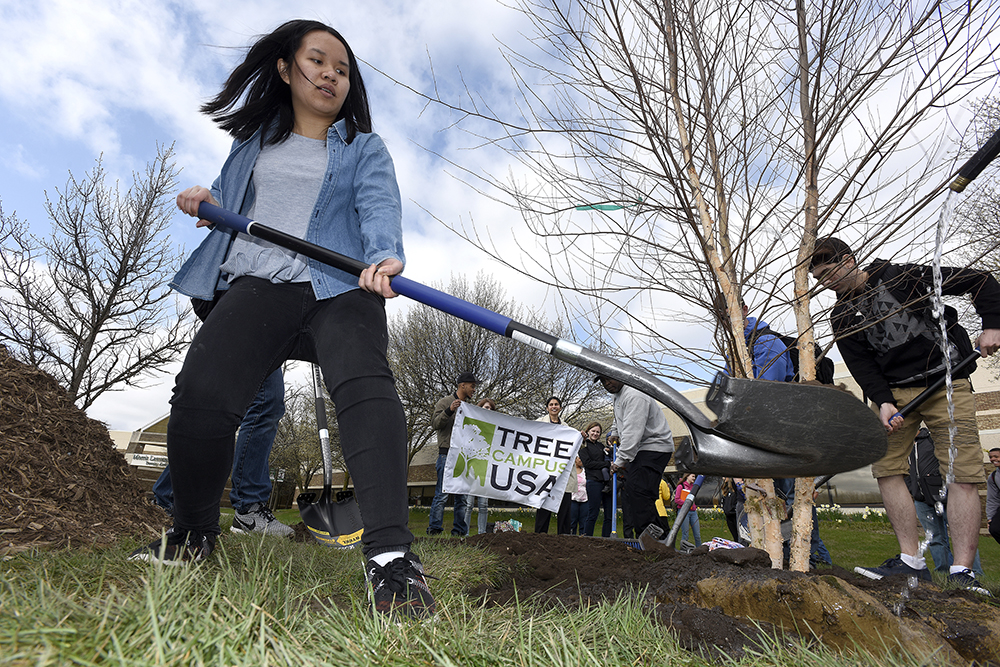
WCC student Dinh Luu helps to plant a river birch tree on campus during an Urban Trees Day event on April 12. | Photo by Lon Horwedel
BY RICH REZLER
Communications Manager
Located on the site of a former apple orchard, Washtenaw Community College’s main campus has a long alliance with trees. Nearly 50 years after the transformation of the Franzblau family’s farm began, the college was recognized for its continued management of the 295-acre campus as an urban tree forest.
WCC recently became one of four colleges in the state of Michigan to receive Tree Campus USA certification from the Arbor Day Foundation and the Michigan Department of Natural Resources.
On Tuesday, April 11, WCC Landscape and Grounds Department manager Holly Herman and landscape planner Donna Reincke attended a full-day event at the University Club of Michigan State University in Lansing, during which Tree City USA and Tree Campus USA certification recipients were recognized and keynote speakers discussed urban forest management topics.
According to Reincke, receiving the certification was an honor, lunch was good, and the speakers were insightful; but she found herself itching to end the formalities and get back to campus and the kind of tasks that helped WCC earn the award in the first place.
By 9:30 a.m. the following morning, she was behind a podium on stage at WCC’s Towsley Auditorium, giving an Urban Trees Day lecture to students, faculty, staff and community members. An hour later, she was outside – with a new ‘Tree Campus USA” baseball cap topping her more familiar work clothes – overseeing a group of students as they planted a river birch tree outside of the Morris Lawrence Building.
That new river birch, a white buckeye tree planted later in the day, and the apple trees that remain since ground was broken for the first campus buildings in the summer of 1967 are all part of a roster of approximately 1,600 trees that the WCC facilities management department inventories and maintains. That total doesn’t include the hundreds of trees in natural forest areas located outside the campus’ 147 acres of maintained grounds.
Hunter said achieving Tree Campus USA designation demonstrates a commitment to proper care of the urban forest by the Landscape and Grounds Department and the entire campus community. She is also quick to point out that achieving the honor is one of many initiatives her department has outlined toward a more sustainable practice on campus.
“As a Tree Campus USA site, we hope to set a great example for students, staff, faculty and visitors on the value of trees,” Hunter said. “We also want to ensure that the learning environment we provide in the future is more enjoyable, stimulates all of the senses, and provides greater diversity than it does today. Being a designated Tree Campus USA site means we are actively planning for the future.”
The Arbor Day Foundation is the same organization that has granted Ann Arbor with its Tree City USA status for 36 consecutive years. A total of 111 Michigan communities earned Tree City USA recognition at the April event, the eighth-most nationally.
The DNR also recertified two Michigan utilities (Lansing Board of Water and Light and ITC Holdings) through the Arbor Day Foundation’s Tree Line USA program.
WCC was the only new member on the organization’s Tree Campus USA list, joining the University of Michigan, Western Michigan University and Calvin College. The WCC facilities management department received a flag, plaque and other signage to promote the certification.
Requirements for Tree Campus USA consideration include maintaining a tree advisory committee, having an overall tree management plan, having a dedicated tree care budget, providing student service-learning projects, and observing Arbor Day.
“Students are eager to volunteer in their communities and become better stewards of the environment,” said Matt Harris, chief executive of the Arbor Day Foundation. “Participating in Tree Campus USA sets a fine example for other colleges and universities, while helping to create a healthier planet for us all.”
